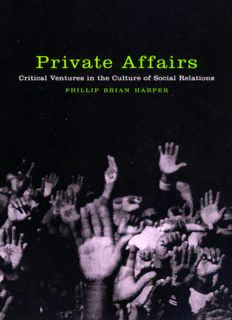
Private Affairs: Critical Ventures in the Culture of Social Relations (Sexual Cultures Series) PDF
Preview Private Affairs: Critical Ventures in the Culture of Social Relations (Sexual Cultures Series)
Private Affairs SEXUAL CULTURES: New Directions from the Center for Lesbian and Gay Studies General Editors: José Esteban Muñoz and Ann Pellegrini Times Square Red, Times Square Blue Samuel R. Delany Private Affairs Critical Ventures in the Culture of Social Relations Phillip Brian Harper Private Affairs Critical Ventures in the Culture of Social Relations PHILLIP BRIAN HARPER a NEW YORK UNIVERSITY PRESS New York and London NEW YORK UNIVERSITY PRESS New York and London Copyright © 1999 by Phillip Brian Harper All rights reserved Library of Congress Cataloging-in-Publication Data Harper, Phillip Brian. Private affairs : critical ventures in the culture of social relations / Phillip Brian Harper. p. cm. — (Sexual cultures : new directions from the Center for Gay and Lesbian Studies) Includes bibliographical references and index. ISBN 0-8147-3593-2 (cloth : acid-free paper) ISBN 0-8147-3594-0 (pbk. : acid-free paper) 1. Privacy, Right of. 2. Interpersonal relations and culture. 3. Privacy. 4. Minorities—Civil rights. I. Title. II. Series. JC596 .H37 1999 323.44'8—dc21 99-6005 CIP New York University Press books are printed on acid-free paper, and their binding materials are chosen for strength and durability. Manufactured in the United States of America 10 9 8 7 6 5 4 3 2 1 for Thom, in eager anticipation Contents Preface ix 1 Private Affairs Race, Sex, Property, and Persons 1 2 “The Subversive Edge” Paris Is Burning, Social Critique, and the Limits of Subjective Agency 33 3 Playing in the Dark Privacy, Public Sex, and the Erotics of the Cinema Venue 60 4 Gay Male Identities, Personal Privacy, and Relations of Public Exchange Notes on Directions for Queer Critique 89 5 “Take Me Home” Location, Identity, Transnational Exchange 125 Afterword 155 Bibliography 159 Index 169 About the Author 189 vii Preface On the night of Monday, August 17, 1998, President Bill Clinton de- livered a televised address to the nation during which he admitted that, contrary to what he had asserted over the preceding seven months, he did have a relationship with Monica Lewinsky—presum ably during the period in the mid 1990s when she was a twenty-one- year-old unpaid White House intern—and that that relationship was “not appropriate.”1 Rather than belaboring—or even elaborating— this point in his remarks, however, the president instead used the speech as an occasion to denounce the investigation into his activi ties then being conducted by independent counsel Kenneth W. Starr, and, in particular, to assert as rightfully ineligible for investigative scrutiny the “private life” to which a sitting president, no less than the rest of the citizenry, is fundamentally entitled. Indeed, having been invoked a total of seven times in an address that clocked in at well under five minutes, privacy would seem to con stitute not only the chief focus of the president’s remarks in the par ticular instance but also the primary conceptual and discursive cate gory through which what is essential to the life of the nation is dif ferentiated from that which has no bearing upon it. Clinton himself recurred to precisely this distinction when he urged that we “get on with our national life” as opposed to “the pursuit of personal de struction and the prying into private lives” with which the Starr in vestigation had “distracted” the country’s attention. But of course, if it were possible for personal behavior to be rendered functionally ir relevant to national interest by virtue merely of presidential decree, then we would not have seen the number of military personnel ix
Description: